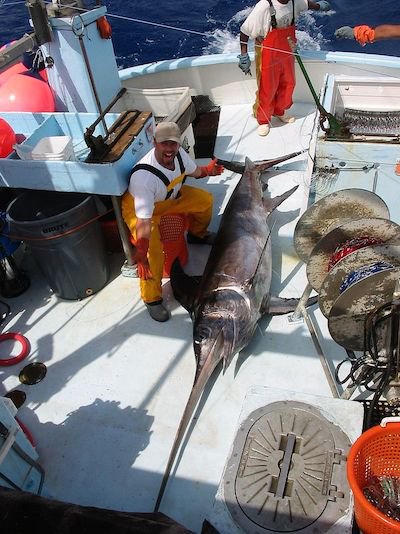Hawaii has been at the center of the fishing news spotlight for several weeks now, beginning with President Obama’s explosive and fast-moving expansion of George W. Bush’s Papahanaumokuakea marine monument and now with a focus on slave labor allegations among the island state’s big-boat fleet.
A large swordfish (Xiphias gladius) on the deck of a longliner. Derke Snodgrass, NOAA Photo LibraryOne could spend time grappling with the idea that perhaps the AP story broke shortly after the Hawaiian monument was expanded to drown out any objections to the way of life for Hawaiian fishermen. How can you feel sorry for a fleet that routinely mistreats and illegally restricts its crew (never mind the fact that the people affected by these two stories don’t even overlap)?
It can be satisfying to speculate, but if we focus on the conspiracy theory, then we’re not solving the real problems — that small-boat Hawaiian fishermen have lost access to a significant portion of their livelihood and that a long-standing loophole has allowed the large-boat fleet to treat foreign crews like indentured servants (or worse).
It’s not hard to imagine business owners taking advantage of loopholes that effectively allow them to underpay, underfeed and overwork their staff, especially when those people are from a different culture that doesn’t have high standards for working conditions.
The fault ultimately lies with the fleet owners who, like the Thai seafood kingpins we’ve so reviled for all these months, allowed this kind of treatment of fellow human beings. We should never hold ourselves to a lower standard than our competition. But one has to wonder where the oversight was. This is a significant loophole in federal fisheries legislation, which stipulates American-flagged vessels must be staffed with 75 percent American workers.
It’s not unheard of for fishing crews (especially on smaller boats) to bucket and chuck it, run low on staples, work hours on end hauling gear without a break, barely making enough in a season to catch a flight home. But the difference is that these circumstances are generally entered into knowingly. And if they aren’t and the working conditions are dangerous, American workers know they have legal recourse.
Whole Foods vowed to stop buying fish from foreign-crewed boats until they could be sure the workers are being treated fairly. The Honolulu Fish Auction is committed to selling fish only from boats that are using a new contract that aims to eliminate forced labor practices. Federal and local authorities in Hawaii have formed a task force and are vowing to resolve the problem by weeding out the bad seeds.
There are bright spots here. According to the AP report, “Hawaii's fishing industry is otherwise one of the most tightly regulated for catch limits and sustainability, attracting companies that pride themselves on being ocean-friendly.”
We can resolve this problem. But the image recovery will take some time. Unfortunately, for most Hawaiian fishermen now shut out of productive and well-managed fishing grounds, time is the one thing they didn’t get.







